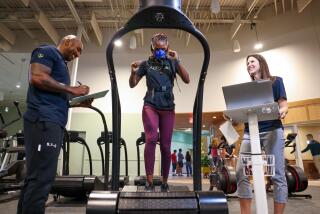Column: Chiropractors see diabetes as a chance for new patients — and profit
- Share via
A Sacramento chiropractor, James Joseph Martin, was arrested in July on felony charges of practicing medicine without a license and grand theft after authorities said he claimed to be a “thyroid and diabetic specialist” who practiced “functional neurology and metabolic medicine.”
According to the California Board of Chiropractic Examiners, Martin presented himself as a “doctor of pastoral science,” licensed by the Pastoral Medical Assn. The Medical Board of California ruled that “doctor of pastoral science is not recognized in California and does not authorize anyone to practice medicine or any of the healing arts in the state.”
What’s noteworthy about the case isn’t that a chiropractor was passing himself off as a diabetes authority. Rather, it’s that so many other chiropractors do it as well — yet manage to stay within the law.
“Diabetes and thyroid issues have become the hot topic among chiropractors,” said Sergio Azzolino, a San Francisco chiropractor who serves as chairman of the Board of Chiropractic Examiners, the state agency that oversees the profession. “Some want to help people. Others are just looking to make a buck.”
Part of that is because of the efforts of a Colorado business called Functional Medicine Masters, which, for a fee, instructs chiropractors in ways to expand their practice into diabetes care while also staying within legal and regulatory boundaries that prohibit chiropractors from practicing medicine.
The firm’s website boasts that it can help triple the income of chiropractors by “tapping into a huge patient market that is fed up with the medical model.” It features a cartoon character called “Dr. Mike,” who is depicted being showered with money after treating “a new type of chiropractic patient.”
Diabetes is one of the country’s fastest-growing health problems, and many chiropractors nationwide have moved aggressively to get a piece of the action.
You’ve no doubt seen newspaper ads that tout “breakthroughs” in diabetes research and even a possible reversal of the condition. People with diabetes are invited to attend a free dinner or seminar where all will be revealed.
In most cases, that free event will be a sales pitch from a chiropractor offering months of treatment, including lightly regulated nutritional supplements, that can cost thousands of dollars.
And in some cases, doctors and officials say, that treatment may be little more than snake oil.
“They’re just taking people’s money for something that’s probably going to have very little effect,” said Dr. Tom Buchanan, head of the Division of Endocrinology and Diabetes at USC’s Keck School of Medicine.
“It seems dangerous that people would seek this type of treatment for a very serious medical condition,” he said.
State rules say that a chiropractor “may manipulate and adjust the spinal column and other joints of the human body, and in the process thereof, a chiropractor may manipulate the muscle and connective tissue related thereto.”
No surprise there. But what many people may not realize is that a licensed chiropractor also “may treat any condition, disease or injury in any patient … so long as such methods and treatment do not constitute the practice of medicine.”
That’s a considerable amount of wiggle room — and a potentially huge opportunity for any chiropractor who deems a background in nutrition and wellness as sufficient to treat people with Type 2 diabetes.
The vast majority of those with diabetes worldwide have Type 2, which is frequently associated with obesity and often requires medication. Type 1 is an autoimmune disorder requiring multiple daily insulin injections.
To be sure, most chiropractors undoubtedly could provide helpful advice to someone dealing with complications related to obesity — any dietary corrections can be a step in the right direction. And diabetes has led some patients to turn to other alternative therapies, such as homeopathy, acupuncture and yoga.
Where some chiropractors may overstep, however, is in systematizing treatment more for commercial gain than the patient’s welfare.
I attended one of the free “diabetes breakthrough” dinners a few years ago at a hotel near Los Angeles International Airport. The chiropractor running the shindig said he could reverse Type 2 diabetes through a program of “cleansing” the system, dietary changes and “high-potency” herbs and supplements.
He pointedly didn’t say during his presentation how much this would cost. But I found out afterward that a year and a half of treatment could run as much as $15,000.
USC’s Buchanan said he’s unaware of any dietary supplement “that will have a meaningful impact on Type 2 diabetes.”
Where an outfit like Functional Medicine Masters comes in handy is laying out the playbook for chiropractors to attract and treat people with diabetes without running afoul of state regulators. The business is the brainchild of a pair of chiropractors, Brandon and Heather Credeur.
According to their website, the couple will lead clients through the entire process, from designing ads and putting together the initial free dinner to following through with regular treatment.
The site features a video of Brandon Credeur boasting that he and his wife “built a system that creates massive income in the chiropractic practice.”
A spokesman for Brandon Credeur instructed me to email some questions and said Credeur would answer in short order. As of Thursday afternoon, no response. Martin, the Sacramento chiropractor, also couldn’t be reached for comment.
Robert Puleo, executive officer of the California Board of Chiropractic Examiners, said entrepreneurs such as the Credeurs have taught chiropractors how to craft ads that suggest a cure for diabetes is feasible without actually saying they can do it.
Likewise, they’ve taught practitioners how to run free dinners and seminars in such a way that no potentially fraudulent claims are made. The focus is always on what’s possible, not probable.
“If you say you can cure diabetes, we have a problem with that,” Puleo said. “But it’s very difficult to prove false and misleading marketing, especially when it’s so carefully worded.”
He said offering advice on diet and exercise, along with selling dietary supplements, “is within the scope of chiropractic practice.”
“Whether it’s efficacious when it comes to diabetes, I don’t know,” Puleo said.
Brandon and Heather Credeur were charged in 2013 by Colorado authorities with portraying themselves to the public “as being authorized to practice medicine” and “being able to provide medical services.”
They succeeded last year in having the case dismissed.
David Lazarus’ column runs Tuesdays and Fridays. He also can be seen daily on KTLA-TV Channel 5 and followed on Twitter @Davidlaz. Send your tips or feedback to [email protected].
ALSO
Years after falling victim to a Ponzi scheme, Simi Valley retiree wins $15.6-million judgment
Here’s why drug prices rise even when there’s plenty of competition
Nearly all California workers would be eligible for a retirement plan in bill headed to governor







